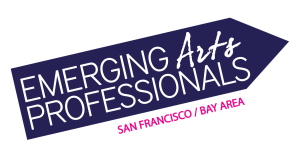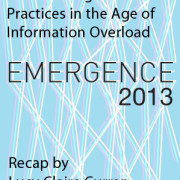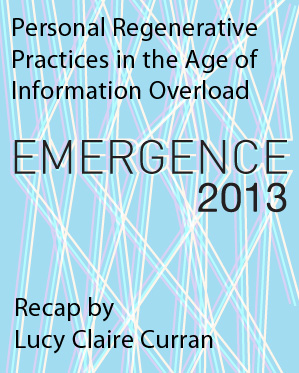Personal Regenerative Practices in the Age of Information Overload
I am so grateful to have been able to take part in the morning breakout session on personal regenerative practices at Emergence, the Emerging Arts Professionals daylong annual convening on June 3, 2013. Facilitated by Emma Bailey, associate producer at Citizen Film; Carrie Blanding, former executive director of the San Francisco Contemporary Music Players; and Yesenia Sanchez, coach and consultant, this session explored how we can rest and regroup as arts professionals in the age of around-the-clock email and social media.
How can we make time for the creative work that most inspires us when we barely even have time to do laundry?
That’s Just How We Roll: The Balance Wheel and Beyond
Emma Bailey started us off with an exercise called The Balance Wheel.
The guiding question for the Balance Wheel exercise was: “How do you
spend your time and energy?” We were to choose eight areas of our life that we felt took up a significant amount of our time and energy. Next, we divided a circle into eight pie-wedge sections of equal size, each representing a different area of our life. We then drew a line across each section to indicate how fulfilled and satisfied we felt in that area of our life.
The closer the line to the middle of the circle, the less satisfied we were; the further out towards the outside of the circle, the more satisfied.
When we were done, Emma asked for us to share what we had discovered. We then spent a few minutes teasing out why our wheels looked the way they did and how we could make them more balanced. Many of us in the room felt that we spent most of our time trying to catch up with the necessary tasks of daily living. As a result, studio time or creative time or regenerative time – or any sort of time that allowed us to feel rested, rejuvenated, or inspired – was liable to be lost in the crush of “getting more pressing things done.”
The end result? All of us often ended up feeling depleted, frustrated, and discouraged.
Artists without Borders: The Importance of Boundaries in a Creative Life
After this lopsided time-allocation has been identified, what in the world is an artist supposed to do? It’s one thing to become aware of the problem, but it’s a whole different matter to begin to use our time more effectively.
Carrie Blanding followed up the Balance Wheel Exercise by leading a discussion about the importance of carving out time for recreation, and even time for doing nothing. We talked in particular about setting healthy boundaries at work and with family members and friends.
Setting boundaries, Carrie explained, might be as simple as telling family members, friends, and coworkers: “This is when I’m available, and this is when I will be busy with my creative work.”
Carrie also shared her technique of “managing expectations.” In other words, it helps to be straightforward and upfront with coworkers and others about when to expect that a particular project will be completed. All in all, the conversation was constructive and helpful, yielding several pragmatic and common sense approaches to achieving more balance in the face of the daily “to dos.”
Practice, Practice, Practice
To wrap up the hour, Yesenia Sanchez spoke to us about positive practices and empowering beliefs that can support us in achieving more balance and fulfillment in their lives. She started out by focusing on common ways we deplete our energy and creativity. The list included cramming our days and nights with obligations (gulp!) and indulging in people-pleasing to the extent that we give away our personal power (oh, dear, this one’s familiar, too!).
But don’t worry, says Yesenia. There’s hope!
She introduced a series of practices to help regenerate and rejuvenate on a daily basis:
- Getting clear on what you want to be creating in your life, and then checking in daily with yourself on whether or not you are living your vision is empowering.
- “Unplugging” in a very literal way is not only important, it’s essential. Try turning off your cell phone, perhaps just for a couple of hours at first. If you get really ambitious, you could even try it for a whole weekend. (Gasp!)
- Doing things differently is very good for the brain, and it can also help us to regenerate and keep things fresh. This could mean taking a different route to work or even brushing your teeth with your non-dominant hand.
- Practice having necessary conversations, even if they are difficult or uncomfortable. Voicing concerns right away, instead of waiting until resentments have reached a boiling point, can go a long way toward smoothing out difficulties in relationships.
To wrap up her time, Yesenia reminded us that we all usually have more power than we think to turn any situation in our lives in a more positive direction. And
She left us with an empowering belief that she encouraged us to take on as our own to drive us forward in our development as artists: “Your life,” said Yesenia, “is precious. It’s worth it to pursue the life you want to lead.”
All in all, it was an inspiring and informative hour. Having talked through common stumbling blocks and shared frustrations with the others in the room, I felt much less alone. In addition, I was equipped with a new set of inspiring tools and practices that I could use to achieve more balance in my life as an arts professional.
About Lucy Claire Curran
Lucy Claire Curran is a freelance writer living and working in San Francisco, CA. A recent graduate of Harvard College with a degree in English, Lucy Claire is currently at work on the manuscript of her first novel, titled The Third Hit. In addition to writing poetry and prose, Lucy Claire loves reading, painting, laughing, and going on adventures.






